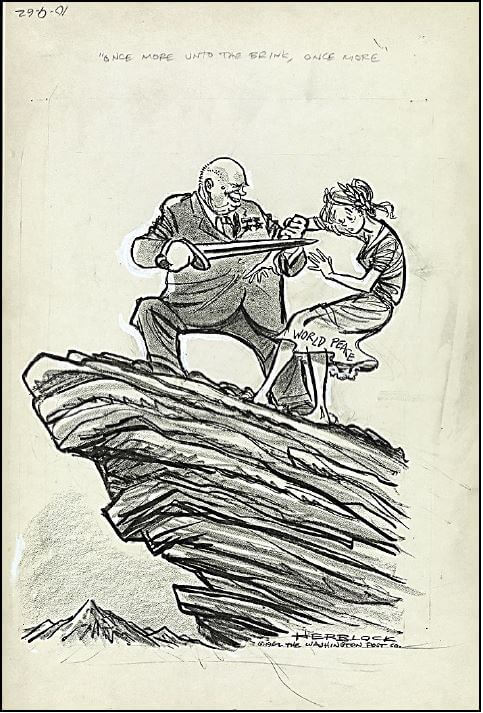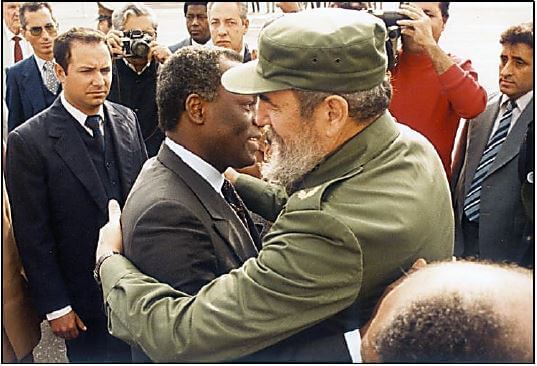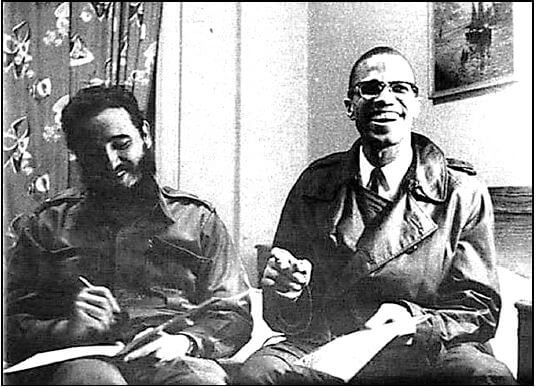HISTORY PAPER 1 GRADE 12 ADDENDUM - NSC EXAMS PAST PAPERS AND MEMOS JUNE 2019
Share via Whatsapp Join our WhatsApp Group Join our Telegram GroupHISTORY
PAPER 1
GRADE 12
NSC EXAMS PAST PAPERS AND MEMOS JUNE 2019
ADDENDUM
QUESTION 1: HOW DID THE CUBAN MISSILE CRISIS LEAD TO COLD WAR TENSIONS BETWEEN THE USA AND USSR IN THE 1960S?
SOURCE 1A
This is an extract from a letter from chairman Khrushchev to president Kennedy (April 18, 1961).
Mr President (Kennedy): I send you this message in an hour of alarm, fraught with danger for the peace of the whole world. Armed aggression has begun against Cuba. It is a secret to no one that the armed bands invading this country were trained, equipped and armed in the United States of America. The planes which are bombing Cuban cities belong to the United States of America, the bombs they are dropping are being supplied by the American Government … Your statement a few days ago that the USA would not participate in military activities against Cuba created the impression that the top leaders of the United States were taking into account the consequences for general peace and for the USA itself which aggression against Cuba could have … As far as the Soviet Union is concerned, there should be no mistake about our position. We will render the Cuban people and their government all the necessary help to repel an armed attack on Cuba ... [Taken from On The Brink: From Bay of Pigs to the Cuban Missile Crisis by Matthew Mooney] |
SOURCE 1B
This source is an extract from a reply from president Kennedy to chairman Khrushchev (April 18, 1961).
Mr Chairman (Khrushchev): You are under a serious misapprehension in regard to events in Cuba. For months there has been evident and growing resistance to the Castro dictatorship. More than 100 000 refugees have recently fled from Cuba to neighbouring countries … It cannot be surprising that, as resistance within Cuba grows, refugees have been using whatever means are available to return and support their countrymen in the continuing struggle for freedom. Where people are denied the right of choice (the ability to choose a different form of government besides communism), recourse to such struggle is the only means of achieving their liberties … You should recognise that free peoples in all parts of the world do not accept the claim of the historical inevitability of the communist revolution. What your government believes is its own business; what it does in the world is the world’s business. The great revolution in the history of man, past, present and future, is the revolution of those determined to be free. [Taken from On The Brink: From Bay of Pigs to the Cuban Missile Crisis by Matthew Mooney] |
SOURCE 1C
This source explains the reasons why Khrushchev decided to place nuclear missiles in Cuba.
The United States had already surrounded the Soviet Union with its own bomber bases and missiles. We knew that American missiles were aimed against us in Turkey and Italy, to say nothing of West Germany. It was during my visit to Bulgaria that I had the idea of installing missiles with nuclear warheads in Cuba without letting the United States find out they were there until it was too late to do anything about them. Everyone agreed that America would not leave Cuba alone unless we did something. We had an obligation to do everything in our power to protect Cuba’s existence as a socialist country and as a working example to the other countries in Latin America ... The Americans had surrounded our country with military bases and threatened us with nuclear weapons and now they would learn just what it feels like to have enemy missiles pointing at you; we'd be doing nothing more than giving them a little of their own medicine. [Taken from On The Brink: From Bay of Pigs to the Cuban Missile Crisis by Matthew Mooney] |
SOURCE 1D
This cartoon was published in the Washington Post, 9 October 1962 and depicts president Khrushchev role in the Cuban Missile Crisis. 
[From http://www.loc.gov/pictures/item/2011661779/. Accessed on 04 January 2019]
QUESTION 2: WHY DID CUBA BECOME INVOLVED IN THE ANGOLAN CIVIL WAR?
SOURCE 2A
This extract is taken from an interview by David Deutschmann with Jorge Risquet, a member of the Cuban government. Risquet is being questioned about the Cuban involvement in the Angolan Civil War.
Deutschman: It is said that the Cuban presence in Angola had expansionist (colonising) aims, and that Cuba was acting as a puppet (under the control) of the Soviet Union. What is your response to this? [From https://espressostalinist.com/category/congo-zaire. Accessed on 04 January 2019] |
SOURCE 2B
This extract is taken from a speech given by Fidel Castro to a mass rally of more than a million Cubans in Havana on 22 December 1975. Castro is explaining why Cuban soldiers were being sent to newly independent Angola to support the MPLA.
African blood flows freely through our veins. Many of our ancestors came as slaves from Africa to this land. As slaves they struggled a great deal. They fought as members of the liberating army of Cuba. We’re brothers and sisters of the people of Africa and we’re ready to fight on their behalf. [From Cuba and Angola. Fighting for Africa’s Freedom and our Own (Pathfinders, 2013), p31] |
SOURCE 2C
This extract is part of an interview that was conducted with the former South African Prime Minister, BJ Vorster, by Clarence Rhodes of UPITN-TV (United Press International Television News) on 13 February 1976.
Rhodes: President Kaunda of Zambia described the Soviet and the Cuban intervention in Angola. I think the quote is ‘a plundering (thieving) tiger and its deadly cub’. … Would you say that this then poses a bigger threat than the emergence of yet another independent black African nation on South African borders? [Taken from http://www.sahistory.org.za/archive/interview-south-african-prime-minister-mr-b-j vorster mrclarence-rhodes-upitn-tv-13-february. Accessed on 04 January 2019.] |
SOURCE 2D
This picture shows former Cuban President Fidel Castro (R) saying goodbye to Angola's President Jose Eduardo Dos Santos (L) at Jose Marti International Airport in Havana, Cuba, on December 19, 1988. 
[From https://www.newsweek.com/fidel-castro-greatest-legacy-africa-angola-526321. Accessed on 04 January 2019.]
QUESTION 3: WHAT WERE THE REASONS FOR THE FORMATION OF THE BLACK POWER MOVEMENT IN THE USA IN THE 1960s?
SOURCE 3A
This is an extract of a speech by Huey Newton on the 2nd May, 1967. He explains the reasons why Blacks should arm themselves for self-protection.
The Black Panther Party for Self-Defence calls upon the American people in general and the black people in particular to take careful note of the racist California Legislature which is now considering legislation aimed at keeping the black people disarmed and powerless at the very same time that racist police agencies throughout the country are intensifying the terror, brutality, murder, and repression of black people. [From https://spartacus-educational.com/USApantherB.htm. Accessed on 04 January 2019.] |
SOURCE 3B
This is an extract from a speech by Malcolm X (9th November, 1963).
I knew they (FBI) were watching us. ... They heavily focused on us when we started to grow so rapidly. We began to grow rapidly really after Martin Luther King was killed. ... With Martin Luther King's death, by June, my party was jumping by leaps and bounds. In a matter of six months, we swelled; in 1968, from 400 members to 5,000 members and 45 chapters and branches. ... Our newspaper swells to over 100,000 circulations. By mid 1969, we had a 250,000 circulation. [Taken from htpp://www.spartacus-educational.com. Accessed on 04 January 2019.] |
SOURCE 3C
This is an extract of Malcolm X’s, speech on the 9th November, 1963 where he explains the need for revolution and bloodshed to bring about change for black Americans.
Look at the American Revolution in 1776. That revolution was for what? For land. Why did they want land? Independence. How was it carried out? Bloodshed. Number one, it was based on land, the basis of independence. And the only way they could get it was bloodshed. The French Revolution – what was it based on? The landless against the landlord. What was it for? Land. How did they get it? Bloodshed. Was no love lost, was no compromise, was no negotiation. I'm telling you – you don’t know what a revolution is. [Taken from htpp://www.spartacus-educational.com. Accessed on 04 January 2019.] |
SOURCE 3D
This is a 1960 photograph of a meeting in Harlem between Fidel Castro and Malcolm X. 
[From http://sfbayview.com/. Accessed on 04 January 2019.]
ACKNOWLEDGEMENTS
Visual sources and other historical evidence were taken from the following:
On The Brink: From Bay of Pigs to the Cuban Missile Crisis by Matthew Mooney, Department of History, The University of California, Irvine.
http://www.loc.gov/pictures/item/2011661779/. Accessed on 04 January 2019.
https://espressostalinist.com/category/congo-zaire. Accessed on 04 January 2019.
Cuba and Angola. Fighting for Africa’s Freedom and our Own (Pathfinders, 2013), p31
http://www.sahistory.org.za/archive/interview-south-african-prime-minister-mr-b-j vorster-mrclarence-rhodes-upitn-tv-13-february. Accessed on 04 January 2019
https://www.newsweek.com/fidel-castro-greatest-legacy-africa-angola-526321. Accessed on 04 January 2019
htpp://www.spartacus-educational.com. Accessed on 04 January 2019. http://sfbayview.com/. Accessed on 04 January 2019.